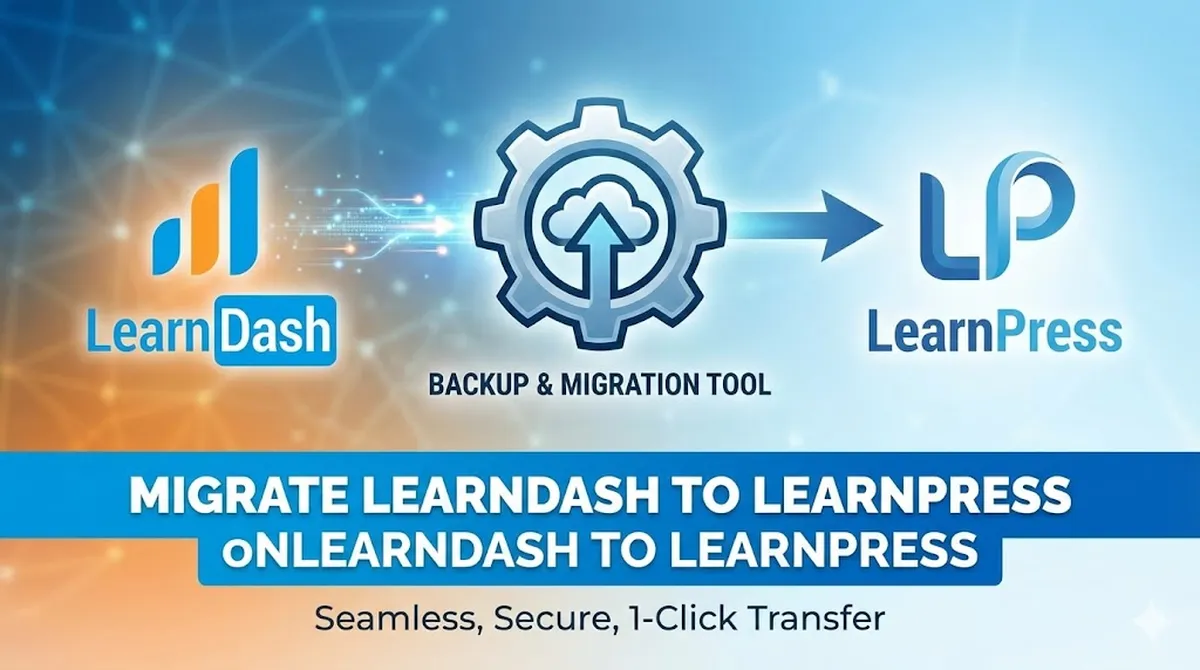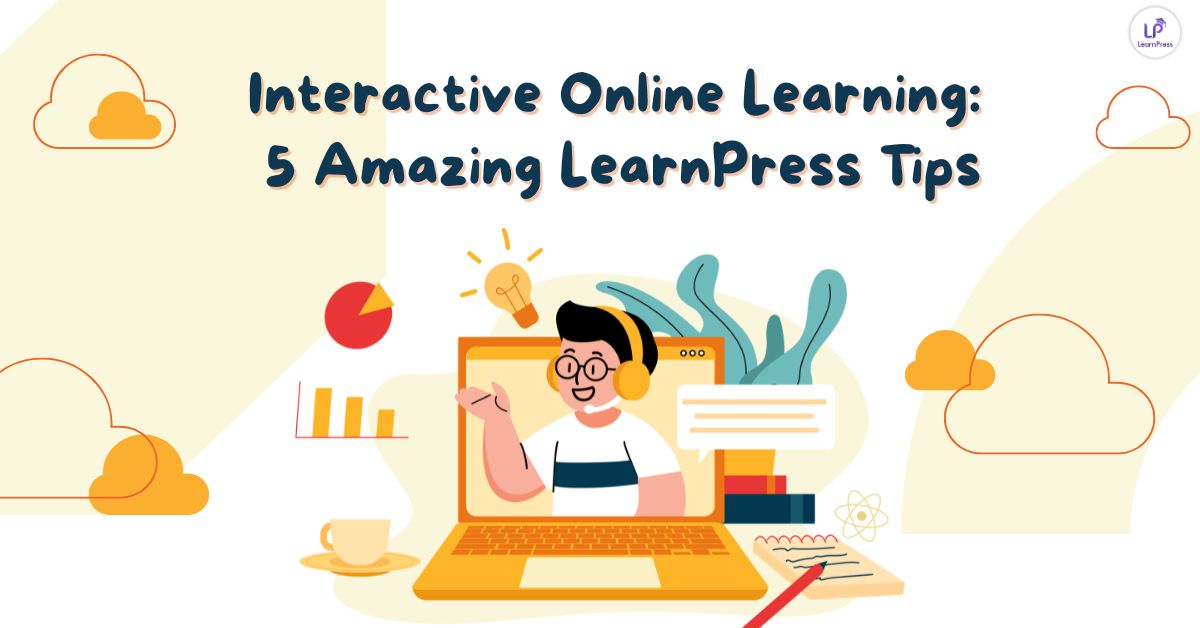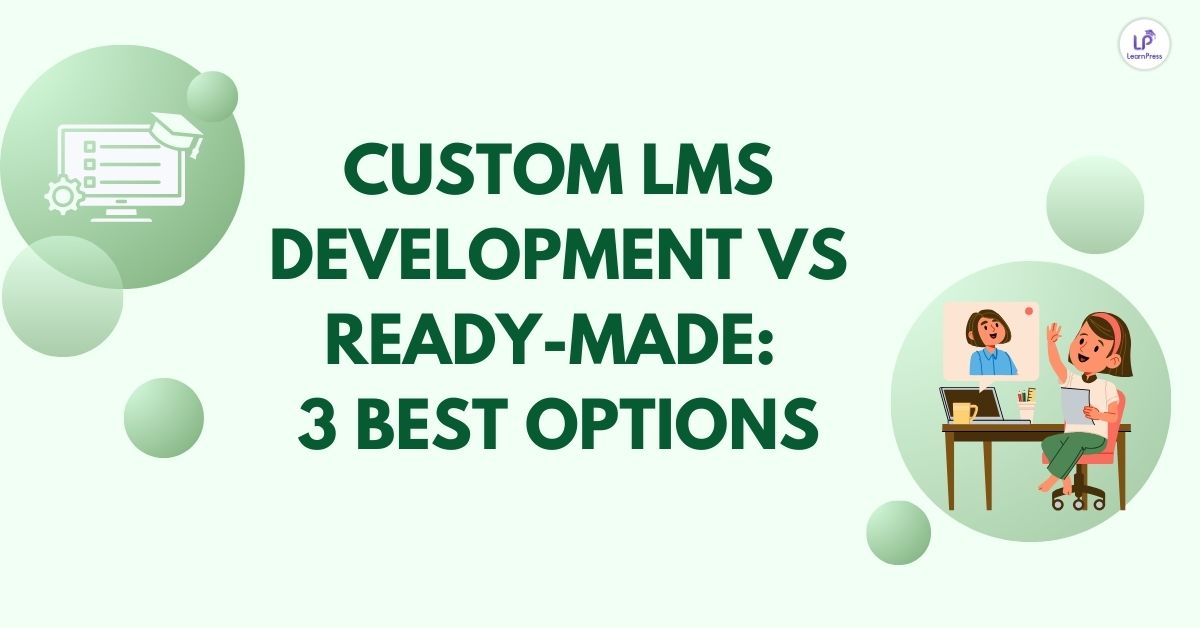Are you ready to share your expertise with a wider audience?
Owning your content channels is more important now than ever and online courses present a powerful opportunity to build a community, expand your audience, and generate income by sharing your expertise.
While platforms like YouTube are excellent for quick video uploads, creating in-depth educational experiences that foster community and drive sales requires a more specialized setup. Robust online course platforms provide the necessary tools to design engaging course pages, structure comprehensive curricula, and effectively market your offerings.
This article dives into some of the leading online course platforms available today, helping you navigate the options to find the perfect fit for your educational venture. For those already using the power of WordPress, integrating a dedicated LMS plugin like LearnPress can transform your existing website into a comprehensive and customizable hub for your online course platform needs.
Table of Contents
What to Look for in Online Course Platforms
Online course platforms generally fall into two categories:
- Course Marketplaces: Your course becomes part of a larger catalog. Customization is typically limited to the course landing page and content. Marketplaces often allow free publishing but take a percentage of sales. Their main advantage is access to an existing student base, beneficial for those without a significant online presence.
- Course Creation Software: These offer greater customization. Users can create branded landing pages, utilize various content formats, and access tools to market their courses. They usually involve a fixed monthly fee, with some also charging transaction fees.
The ideal online course platform depends on unique needs and objectives. Key considerations include:
- Content Formats Supported: Video, audio, PDFs, text, quizzes, assignments.
- Scheduling Capabilities: Features to organize live classes or enable online appointment scheduling.
- Customization Options: Branding, page design, course structure.
- Affordability: Pricing plans suitable for small to medium businesses.
- Assessment Tools: Quizzes, exams, certifications. LearnPress provides robust assessment capabilities, including flexible quiz formats and automated certifications. For more details, visit the LearnPress Key Features.
- Marketing and Payment Features: Sales pages, payment processing, affiliate options. With LearnPress, you can integrate various payment gateways like Stripe and 2Checkout to streamline your course sales. Learn more about these integrations in the LearnPress Add-Ons section.
Here’s a detailed comparison of the top contenders based on these considerations:
| Platform | Best For | Pricing (Starts From) | Transaction Fee |
| LearnPress | WordPress users seeking full control & ownership | Free (Core Plugin) | 0% |
| Udemy | Beginners needing a built-in audience | Free (to publish) | 3% (your coupon) – 63% (Udemy sales) |
| Skillshare | Creatives teaching project-based skills | Free (to publish) | N/A (Paid via royalty pool) |
| Teachable | Creators wanting strong marketing & sales tools | Free Plan ($1 + 10% fee) | 5% (Basic) to 0% (Pro) |
| Podia | All-in-one digital product (courses, downloads) | Free Plan (8% fee) | 0% on paid plans |
| Kajabi | Serious entrepreneurs needing an all-in-one system | $149/month | 0% |
| LearnWorlds | High-end, interactive & white-label school sites | $29/month + $5/sale | $5/sale (Starter) to 0% (Pro) |
| Thinkific | User-friendly course creation with no fees | $36/month | 0% on all paid plans |
| Mighty Networks | Community-led courses & memberships | $49/month | 3% (Community) to 2% (Business) |
With these criteria in mind, let’s examine some top online course platforms.
9+ Leading Online Course Platforms to Consider
Here’s a look at some of the best course platform options available, each with unique strengths:
1. Udemy

Udemy is one of the largest online course platforms and marketplaces, boasting millions of students worldwide. It’s particularly well-suited for instructors launching their first course due to its guided creation process and built-in audience. To offer paid courses, instructors must apply and be approved. The platform emphasizes video content, requiring at least 30 minutes of video and five lectures per course. Udemy provides resources and feedback to help instructors improve their course quality and offers marketing programs to boost visibility, though it takes a significant revenue share for sales it facilitates.
Pros:
- Guided, prescriptive course creation flow
- Access to Udemy’s massive existing student base
- Minimal design or technical skills needed from the instructor
- Marketing and promotional opportunities handled by Udemy
Cons:
- Steep revenue share structure on sales not driven by instructor coupons
- Primarily focused on video content
- Requires application and approval for paid courses
- Less control over branding and pricing
Pricing: Free to publish free courses (under 2 hours of video). For paid courses, Udemy charges a 3% revenue share on sales made via instructor coupons and 63% on other sales (excluding processing fees).
2. LearnPress
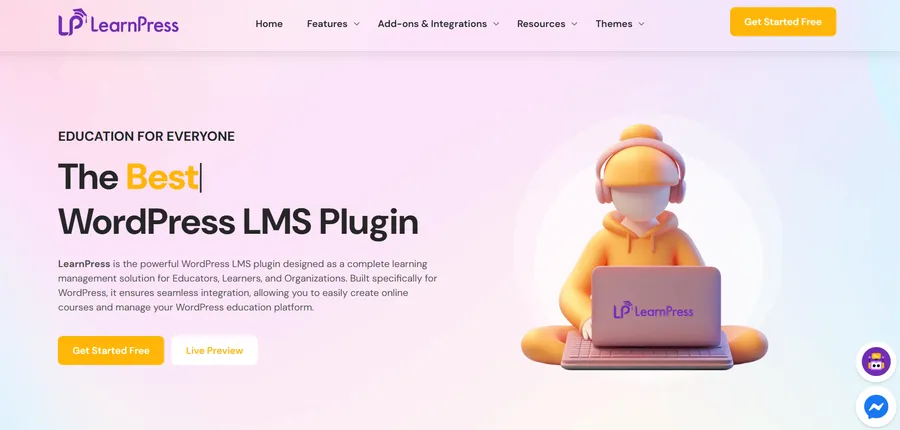
LearnPress is a powerful WordPress LMS plugin designed as a complete solution for turning your WordPress website into an online education platform. Unlike SaaS platforms, LearnPress is self-hosted, meaning you have full control over your content, user data, and customization. It integrates seamlessly into the WordPress ecosystem, allowing you to easily create, manage, and sell online courses right from your own site.
Pros:
- Full Ownership: You own 100% of your data. No one can lock your account or take away your student list.
- No Transaction Fees: You keep 100% of your revenue. LearnPress does not take any percentage of your sales (you only pay your payment gateway, like PayPal or Stripe).
- Unlimited Customization: Because it’s WordPress, you can combine it with thousands of other plugins and use any theme (like Eduma) to create a unique, branded experience.
- Low Starting Cost: The core LearnPress plugin is completely free, allowing you to build and run a basic course with no software costs.
Cons:
- Requires Self-Management: Full control also means full responsibility. You are responsible for your own web hosting, security, backups, and updates.
- Steeper Learning Curve: Compared to all-in-one platforms, you will need a basic understanding of WordPress, themes, and plugins to get everything set up.
- Add-on Costs: While the core is free, you will need to purchase premium add-ons for advanced features like Co-instructors, Commission, Certificates, and advanced payment gateways.
Pricing: The core LearnPress plugin is Free. Premium features can be purchased as individual add-ons or as a complete package with the LearnPress PRO Bundle, which provides a full suite of professional tools to run a complete online academy.
3. Skillshare

Skillshare is an online learning platform geared towards creative skills. It’s an excellent choice for designers, writers, photographers, artists, and entrepreneurs looking to teach practical, hands-on skills. Courses typically consist of 20-60 minutes of video, broken into short lessons, and emphasize a practical project that students complete and share with the community. Skillshare operates on a membership model for students, giving them access to thousands of classes. Instructors are paid based on royalties for minutes watched in their premium classes and referrals.
Pros:
- Quick and easy course setup process
- Specifically designed for teaching creative skills
- Strong community aspect with project-based learning
- Free to create and publish a premium class
Cons:
- Primarily video-based content
- No built-in support for formal assessments like quizzes or exams
- Minimal customization of the course environment
- Payment is based on minutes watched, which can be variable
Pricing: Free for creators to publish a premium class. Instructors earn royalties based on the minutes of their content watched by premium members and $10 for premium membership referrals.
4. Teachable

Teachable is a popular course creation software that empowers creators to build and manage their own online school with advanced marketing features. It offers various customization options for course appearance and sales pages, including a Power Editor for those comfortable with code. Teachable supports diverse content types and integrates with cloud storage services. Creators have flexibility in pricing, offering courses individually or in bundles, with options for one-time fees, payment plans, or subscriptions. Built-in tools for email marketing, coupon creation, and affiliate programs help drive sales and student engagement.
Pros:
- Comprehensive built-in marketing and sales tools
- Custom-code editor for advanced customization
- Flexible pricing and payment options
- Good for building a branded online school experience
Cons:
- Limited number of design templates available
- Transaction fees on lower-tier plans can add up
Pricing: Free plan available (1 published product, 10 students, $1 + 10% transaction fee). Paid plans start from $39/month (Basic plan: 5 products, 5% transaction fee, custom domain, email marketing, coupons, drip content).
5. Podia

Podia is designed as an all-in-one platform for selling digital products, including online courses, digital downloads, coaching sessions, and memberships. It simplifies the process of creating a digital storefront. While template customization is somewhat limited, this can be an advantage for users seeking simplicity. Podia allows for pre-launching courses to collect emails and offers features for bundling products. A key strength is its integrated membership functionality, allowing creators to build private communities with different tiers and exclusive content, moving away from reliance on third-party social platforms.
Pros:
- Simple, clean course outline builder
- Supports multiple types of digital products (courses, memberships, downloads)
- Affordable entry-level pricing
- Built-in email marketing and affiliate marketing tools
Cons:
- Less visually customizable than some competitors
- Transaction fees on the free plan (and lower tiers previously, though check current specifics)
Pricing: Free plan (1 download, 1 coaching product, draft courses, 8% transaction fee). Paid plans start from $33/month (Mover plan) for unlimited courses and members, with lower or no transaction fees on higher tiers.
6. Kajabi

Kajabi positions itself as an all-in-one online course platform for serious entrepreneurs who want to automate their marketing and sales processes. It offers “Funnels” (marketing blueprints) that help create entire marketing sequences from landing pages to email campaigns and checkouts. Kajabi includes robust native email marketing capabilities, allowing for complex automation based on student behavior (e.g., course completion, inactivity). While on the pricier side, it aims to provide a comprehensive solution for building, marketing, and selling online courses without needing numerous third-party integrations for core functionalities.
Kajabi is known for its marketing automation features. To emulate this, LearnPress can be integrated with marketing tools. The article LearnPress Integration With NotificationX: Display Course Enrollment Notifications On Your WordPress Site shows how to use notifications to boost engagement and credibility.
Pros:
- Extensive built-in marketing automation features (“Funnels”)
- Powerful native email marketing tools
- All-in-one solution reduces the need for other tools
- Good for building a sophisticated sales and marketing engine
Cons:
- Significantly more expensive than many other platforms
- Can have a steeper learning curve due to its comprehensive features
- Customization, while good, might not be as granular as some dedicated builders
Pricing: Starts from $143/month (Basic plan) for 3 products, 3 funnels, and 1,000 active customers.
7. LearnWorlds

LearnWorlds is a robust online course platform that excels in providing granular customizability for your online school. While offering pre-built templates, it allows users to delve deep into customizing layouts, colors, typography, and even buttons, making it possible to create a highly unique and branded learning environment. LearnWorlds supports interactive video, assessments, and certificates. It also features a social learning environment and tools to build a strong school website. This platform is suitable for individuals, enterprises, and training centers looking to create professional and engaging online learning experiences.
Pros:
- Extensive visual customization options for a unique brand feel
- User-friendly course builder with interactive elements
- Strong features for creating a complete school website
- Advanced assessment and certification options
Cons:
- Transaction fees on the starter plan
- Some advanced features are locked behind higher-tier plans
Pricing: Starts from $29/month (Starter plan) plus $5 per course sale, including unlimited paid courses and drip content. Higher plans remove transaction fees and add more features.
8. Thinkific

Thinkific is a versatile course creation software known for its user-friendly interface and comprehensive feature set, making it suitable for entrepreneurs, experts, and businesses of all sizes looking to sell online courses. It provides tools to create, market, and sell courses with good control over branding and student data. Thinkific supports a wide range of content types, including video, text, quizzes, surveys, and downloads. It offers robust assessment options and completion certificates. The platform has a strong focus on enabling creators to build a sustainable online education business.
Pros:
- User-friendly interface and easy-to-use website builder
- Extensive support for various assessment types and certificates
- No transaction fees on paid plans
- Good range of integrations and add-ons
Cons:
- The free plan has limitations on features and number of courses.
- Advanced features like API access are on higher-tier plans.
Pricing: Offers a free plan with limited courses and students. Paid plans start from $36/month (Basic plan), offering unlimited courses and students, zero transaction fees, custom domain, and drip content.
9. Mighty Networks
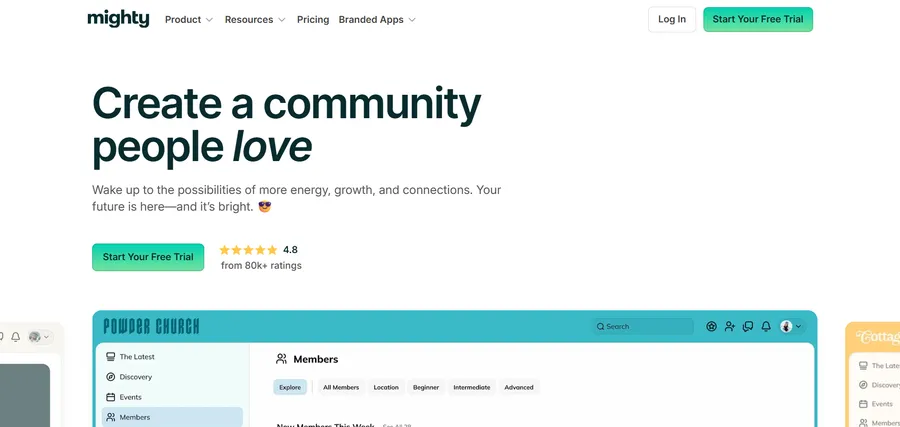
Mighty Networks is a leading platform in the “community-led course” trend. Instead of just focusing on selling a standalone course, this platform helps you build a private, branded community first (like your own exclusive Facebook Group or Discord), and then allows you to sell courses inside that community. It’s an all-in-one solution for combining content, community, and commerce.
Pros:
- Community-First: Drives higher course completion rates as students learn together. Features like “Spaces,” live streams, and forums are central to the experience.
- Native Mobile Apps: Mighty Networks provides a native mobile app (iOS & Android) for your community, giving members easy access on the go (a feature most competitors lack).
- All-in-One Hub: You own your “social network” without the distractions of third-party algorithms or ads.
Cons:
- Not a Traditional LMS: If you just want to sell a simple video course without a community, Mighty Networks might be overly complex and not the right focus.
- Limited Marketing Tools: Its built-in marketing automation and sales funnels are not as powerful or robust as Kajabi’s.
- Transaction Fees: The base plans still charge a transaction fee on your sales.
Pricing: The Courses Plan (which includes courses, challenges, and chat) starts at $109 per month. The Business Plan (for automations) starts at $189 per month.
Choosing Your Ideal Online Course Platform
Whether your passion lies in teaching, growing an audience, or generating income, the right online course platform can help you achieve your objectives. When making your selection, carefully weigh your budget, available time, current online presence, and earning goals. If you’re just starting, experimenting with a course marketplace can be a low-risk way to validate your course topic. Once established, you can always transition to a more robust platform. Ultimately, the best software for online course platforms should empower you to focus on creating valuable content, not on the technicalities of delivery.
FAQs
Q1: What exactly are online course platforms?
Online course platforms are specialized software or services that provide educators and businesses with the tools to create, host, market, and sell educational content to a global audience.
Q2: How do I choose the right online course platform for my needs?
Consider your technical skills, budget, the type of content you'll create (e.g., video-heavy, interactive), marketing needs, and whether you want a standalone platform or integration with an existing site (like WordPress with LearnPress LMS).
Q3: Can I offer free courses on these platforms?
Yes, most online course platforms, including marketplaces and course creation software, allow you to offer free courses, which can be a great way to attract students or offer lead magnets.
Q4: What is the main difference between a course marketplace and course creation software?
A course marketplace (like Udemy) lists your course in a catalog alongside others, offering an existing audience but less branding control and often higher revenue sharing. Course creation software (like Teachable or Kajabi) lets you build your own branded course website, offering more control but requiring you to attract your own students.
Q5: How important is video content for online courses?
Video is highly engaging and often expected in online courses. While not always mandatory (depending on the platform and subject), it significantly enhances the learning experience for many topics.
Q6: What is the main difference between a course marketplace and a course platform?
A course marketplace (like Udemy) is a large "mall" where your course is listed next to competitors. You get access to their audience, but they take a large sales cut (up to 63%). A course platform (like Teachable or LearnPress) is a "software" (SaaS or plugin) that lets you build your own branded website to sell courses. You control everything and keep 100% of your revenue (minus standard payment fees).
Q7: What is the cheapest way to sell online courses?
The cheapest way is using a self-hosted WordPress site with the free LearnPress plugin and a free payment gateway add-on (like WooCommerce or WP Payments). Your only mandatory costs are your domain and web hosting, allowing you to keep 100% of your revenue.
Read more: Top 5 Free WordPress LMS Plugin Options

